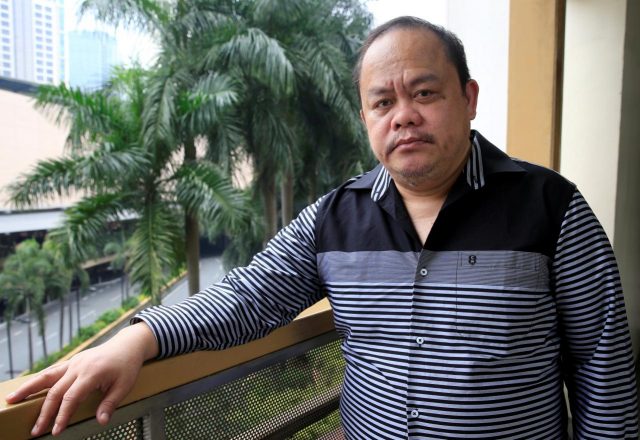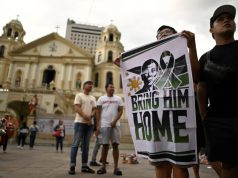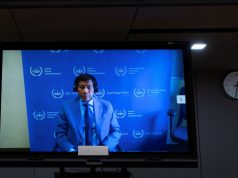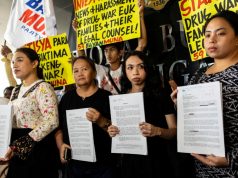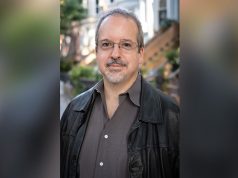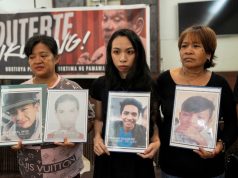MANILA, Philippines — Lawyer Jude Sabio says he hasn’t been home for a year, steers clear of public events and is forever looking over his shoulder after accusing President Rodrigo Duterte of crimes against humanity.
Sabio, a stocky 51 year-old, says he lives in constant fear of reprisals after filing a complaint at the International Criminal Court against the wildly popular Duterte, whose administration Filipinos rate as the best performing since opinion polls started in the 1980s.
A little-known lawyer until he filed the complaint last April, Sabio argues that the deaths of thousands of Filipinos in a brutal war on drugs is Duterte’s method of controlling crime, and that he used the tactic effectively during his 22 years as the mayor of Davao City.
Duterte has repeatedly denied ordering extrajudicial killings while mayor or president and reiterated this month that he would “gladly” go before the ICC. Court Prosecutor Fatou Bensouda had earlier said her office had started a preliminary examination into whether any crimes against humanity had been committed and if ICC had jurisdiction.
The step is the first in a process that could take years to complete, if at all. Since it was set up in 2002, the ICC has received more than 12,000 complaints or communications, just nine of which have gone to trial.
Sabio’s move is unpopular in a country where, despite the bloodshed, Duterte enjoys a cult-like status and has a loyal online following which hounds and harasses his opponents.
The Social Weather Station’s latest quarterly poll shows Duterte’s trust rating bounced back to “excellent” in December from “very high” three months before. Another SWS poll gave his government the best rating so far of any administration.
“When I went to The Hague I received so many threats,” Sabio told Reuters. “The (latest) announcement from the ICC, I‘m also receiving threats. It’s many, I don’t want to read them.”
Presidential spokesman Harry Roque says “domestic enemies of the state” are behind Sabio’s complaint. Asked about Sabio’s safety, Roque said he should report threats to the police.
“We have no ill will against him,” he added. “We know it (the complaint) will not proceed beyond preliminary examination.”
The Punisher
In an interview, Sabio described Duterte as a “death squad president” who bragged in public about killing criminals and promised voters he would kill thousands in an anti-drug crackdown if elected.
Duterte earned the nickname “the Punisher” because of allegations he operated a death squad that killed more than 1,000 criminals when he was Davao mayor. He suggested during a televised presidential election debate in 2016 that more would die if he became president.
“I do not want to commit a crime. But if by chance, God would place me there (as president), you watch out,” he said in widely reported comments. “This 1,000 will be 100,000. You will see the fish in Manila Bay become fat, I will throw you there.”
On the day of his inauguration in June 2016, he told supporters: “If you know any addicts, go ahead and kill them yourself as getting their parents to do it would be too painful.”
Since Duterte took office, 4,021 people have been killed in what police call legitimate operations against “drug personalities” they say ended in shootouts, according to police data. About 2,300 other drug-related homicides have been blamed by police on vigilantes.
Human rights groups say police take their cue from Duterte’s rhetoric and accuse them of executing suspects, mostly drug users and small-time pushers from slum districts. Police deny that and Duterte insists security forces can kill only in self defense.
When he made the ICC complaint, Sabio said he was broke and needed sponsors to pay for his flight to The Hague. He had undergone an angioplasty and been through a marriage breakup, and was working out of an office his friend let him use for free.
He says he is still not fully recovered but he had no regrets.
“I always thought in the past the cases I fought, no matter how small, were preparing me for something big in the future,” said Sabio, who has practiced criminal law for 20 years in the southern city of Cagayan de Oro. “Fate directed me to the ICC.”
Sabio’s involvement started when a man named Edgar Matobato testified to a Senate inquiry in September 2016 that he was a hit man who killed at Duterte’s behest when he was Davao City mayor. Sabio said he learned from a priest that Matobato had no lawyer, so he volunteered.
The inquiry concluded there was no proof of a Davao death squad. It was reopened in February 2017 when a second self-confessed assassin testified, former policeman Arturo Lascañas , but senators again concluded there was insufficient evidence.
Sabio went to The Hague two months later to file a complaint he said is backed by many Filipinos, among them some of Duterte’s political opponents.
Two of those, Magdalo party-list Representative Gary Alejano and Senator Antonio Trillanes IV, have filed a supplementary communication with the ICC to reinforce Sabio’s 77-page complaint. Both have welcomed the ICC’s preliminary examination.
Sabio said he knows what he’s doing will anger most Filipinos, but he’s undeterred.
“Popularity cannot be invoked as a defense in the ICC, it is irrelevant, it doesn’t matter,” he said.
“I don’t care if millions of Filipinos will look at me as a villain.”

